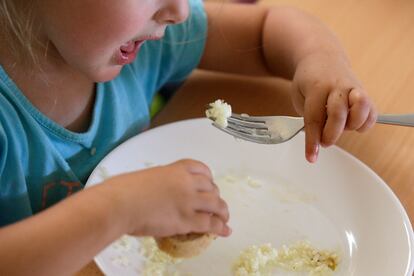A student from a school in Fresnedillas de la Oliva (Madrid) eats in the dining room of the local school.ANDREA COMAS
The three years of the pandemic —with its confinements, reduced social life and distance classes— have worsened the healthy habits of Spanish children and young people: now they do less physical exercise, spend more time in front of screens, sleep less, follow less the Mediterranean diet and feel more unhappy (particularly the girls).
Their rate of overweight or obesity improves slightly, but it still affects almost a third of the total.
This is shown by the
Pasos Study
of the Gasol Foundation, preliminarily presented this Thursday in Madrid, which analyzes the situation of almost 3,000 Spanish minors between the ages of 8 and 16 and compares them with the data obtained in 2019 (last pre-pandemic year).
"One in three Spanish children and young people is overweight or obese, one of the worst figures in Europe," Pau Gasol, former NBA basketball player and president of the entity, pointed out during the presentation, after noting that "this epidemic is marked by social inequalities”.
In other words, it affects children from families with less income almost twice as much, who are also the ones who follow the Mediterranean diet the least and those who consume the most junk food.
The data in this complete report —collected in 223 centers throughout the country— are similar to and complement those of the Aladdin Study, prepared by the Ministry of Consumer Affairs and focused on children from 6 to 9 years of age.
More information
Childhood obesity affects children from families with lower income twice
In reality, the data on overweight and obesity have improved slightly since 2019 (from 36% to 33.5%), but the researchers object to this change: "It may be that the incipient deterioration in health habits has not had time to of consolidation, or else that adolescents who are more overweight have declined to participate, because there is a situation of growing social stigma around weight," said Santi Gómez, the study's principal investigator.
Rafael Escudero, president of the Spanish Agency for Food Safety and Nutrition (Aesan), for his part, stressed that the Ministry of Consumer Affairs is working "on measures that limit the obesogenic environment [which promotes obesity] for minors, as well as its access to drinks and food of low nutritional quality”.
In this sense, he recalled that Alberto Garzón's department is preparing a decree to limit the advertising of unhealthy food and beverages aimed at children.
The rule has raised criticism from the food industry and a political battle with the socialist wing of the government.
emotional well-being
The document presented this Thursday goes beyond weight and analyzes the healthy habits of minors.
One of the most worrying data has to do with emotional well-being: 40.1% of girls between the ages of 8 and 16 in Spain state that they feel worried, sad or unhappy, a much higher percentage than that of boys (23.9 %).
Santi Gómez, the foundation's research director, explains to EL PAÍS that these differences are due to "gender inequalities": "Adolescence is a key period in the identity construction process, and that is precisely why many insecurities in the form of sadness, worry, fears, complexes… Girls are more exposed to this insecurity, because they mature cognitively before boys, and because society exposes them more to feeling insecure”.
In her opinion, “girls are socially more exposed to gender stereotypes, to issues of assessing their body image, and how this affects the way they feel as people.
Of course, there is a gender inequality in how the body is seen, girls are exposed to certain stereotypes, and body image affects them more.
That is proven by many scientific studies.”
In addition, “it can also happen that boys find it difficult to admit that they feel sad, that is like recognizing a weakness, and it is not well seen in the predominant model of masculinity.
I understand that this feeling will be underestimated in boys”, continues the expert.
The research presented this Thursday shows that this concern affects much more in adolescence (41.6%) than in childhood (20.4%).
According to the document, “this dimension is the one that presents the greatest deterioration, which has probably been significantly influenced by the change in social dynamics experienced by childhood, and especially adolescence, during the covid-19 health crisis. 19″.
Another problematic aspect is the time that children and adolescents spend in front of a screen, which continues to grow year after year: minors spend more than three hours a day during the week on these devices, which far exceeds the recommendation of a maximum two hours a day in front of computers, mobile phones, tablets or television.
At the weekend, the time spent on screens is even greater: almost five hours a day.
Non-compliance is higher in the male gender and in adolescence.
Less sport every day
Meanwhile, physical activity —on which there are only partial results— has been reduced by 23 minutes a day compared to the data from three years ago.
The recommendation is that minors do 60 minutes of sports a day, something that was already breached in 2019 but is now further and further away from being fulfilled.
In addition, almost half of the child and adolescent population does not comply with the recommended hours of sleep (11 hours for the youngest, at least 8 for the oldest) both on weekdays and on weekends.
This non-compliance is greater in female participants, in adolescence and in educational centers located in lower-income neighborhoods.
The percentage of young people who do not comply with the recommended hours of sleep has increased by 5.8% for weekdays.
“This lifestyle factor has a structural effect on academic performance, the rest of the lifestyle factors and the well-being and quality of life of society and therefore it is convenient that community health promotion interventions include it. as an essential issue to address”, the study points out.

